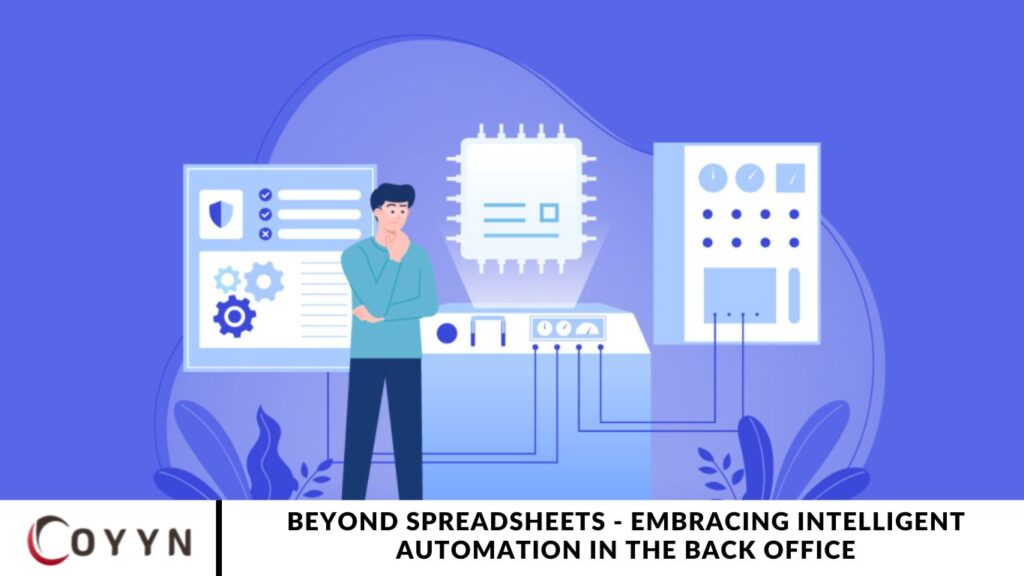Spreadsheets have been a staple in the back office for over four decades, serving as a critical tool for finance, accounting, human resources, IT, data management, and more. For years, they’ve been the go-to solution for running numbers and processing vast amounts of data. However, despite their widespread use, spreadsheets come with significant limitations. A staggering 88% of spreadsheets contain errors, primarily due to simple human mistakes like miskeyed numbers or incorrect formulas.
These errors can lead to costly consequences. Take, for instance, Canadian power company TransAlta, which lost $24 million in 2003 due to a spreadsheet error in contract bids. Nearly a decade later, JP Morgan Chase suffered a $6.2 billion loss in trading, all stemming from a similar spreadsheet mistake.
Fortunately, with the rise of digitization, businesses now have access to technologies that can significantly reduce the risk of human error. One such technology is intelligent automation, which streamlines and automates back-office tasks, ensuring greater accuracy and efficiency. Let’s explore how intelligent automation is transforming the back office and helping businesses thrive.
What is intelligent automation?
Intelligent automation is a game-changing technology that combines AI, machine learning, and robotic process automation (RPA) to streamline office tasks and improve efficiency. By leveraging AI, this technology can analyze vast amounts of data, identify trends, and make decisions at speeds far beyond human capabilities. This is especially useful in AI finance solutions, where intelligent automation can analyze massive datasets in seconds, detect financial anomalies, and even suggest more effective budgeting or investment strategies.
One of the key features of intelligent automation is its machine-learning capabilities, which allow systems to learn from the data they process and improve over time. This means that the more data the system handles, the brighter and more efficient it becomes. Meanwhile, RPA excels at automating repetitive, rule-based tasks, further boosting productivity.
As businesses continue to grow, so does the volume of data they manage. In this fast-paced environment, speed and accuracy are crucial to maintaining growth. Intelligent automation helps meet these demands by handling data-intensive tasks with precision.
The results speak for themselves: studies show that 85% of businesses using intelligent automation have experienced a significant reduction in errors. What’s more, these businesses have also slashed their processing times by up to 80%. By replacing manual spreadsheet work with intelligent automation, companies can save valuable time and resources while improving overall efficiency.
Areas being transformed by intelligent automation
Intelligent automation is increasingly transforming multiple departments within businesses, driving greater efficiency and accuracy. In the finance and accounting sector, tasks like invoicing and auditing have become significantly easier. The system can automatically match transactions, flag discrepancies, and generate financial reports with precision. This means finance teams no longer need to spend countless hours tracking invoices or reconciling numbers on spreadsheets, allowing them to focus on more strategic tasks.
In human resources, intelligent automation is a game-changer, particularly when it comes to payroll. The system ensures employees are paid on time, without delays, and helps reduce the common payroll headaches. It also simplifies leave management by providing a transparent, automated system for leave requests. Additionally, onboarding and offboarding processes have become more streamlined, offering a smoother, more consistent experience for both employees and HR professionals.
Intelligent automation has also greatly enhanced supply chain management. Businesses can now track inventory in real-time, eliminating the need to manage stock levels manually through spreadsheets. The system can even place orders automatically when supplies run low and manage vendor communication, reducing the risk of unforeseen out-of-stock situations that could disrupt operations.
Intelligent automation assists in organizing and cleaning vast amounts of data quickly and efficiently. No more scrolling through endless rows of data on spreadsheets—automation ensures information is easy to access and manage. Furthermore, the system continuously monitors operations and can proactively address any abnormalities, preventing potential issues before they escalate and minimizing downtime.
Why intelligent automation
Spreadsheets have served businesses well for years, but with the rapid pace of technological advancements, specific tasks are now too complex for the traditional grid system. This is where intelligent automation comes into play, efficiently handling the evolving demands of modern business operations. One of the most significant advantages of intelligent automation is its ability to significantly increase accuracy. As we’ve seen, spreadsheets are prone to human errors—small mistakes can lead to big problems, costing businesses time and money.
Intelligent automation has helped companies reduce manual errors by 85% by reducing the effort involved in data handling and transforming business operations. What’s even more impressive is that tasks that once took hours or even days can now be completed in minutes, freeing up time for your teams to focus on strategy and innovation rather than getting bogged down by spreadsheet work.

Another key benefit of intelligent automation is its ability to scale with your business. Whether you’re handling hundreds or millions of data points, automation systems can handle the increased volume without slowing down or crashing—something that spreadsheets, unfortunately, can’t always guarantee.
In today’s fast-paced business environment, staying relevant means adapting to trends quickly. Intelligent automation is built to keep up with the speed of change, allowing businesses to track and respond to market developments in real-time. This ensures you make informed decisions without the hassle of manually updating spreadsheets.
Intelligent automation is revolutionizing the way businesses handle back-office tasks. With faster processing, greater accuracy, and scalability to match business growth, it’s no wonder that companies are shifting away from spreadsheets and embracing the future of automation.
Automating service desk requests
If you’ve ever spent precious time navigating through a robotic answering system, you know why customer service desks are in dire need of an overhaul. In today’s fast-paced world, businesses either commit to staffing customer service experts 24/7 or risk alienating their customers with slow response times and poor solutions. Unfortunately, traditional automation—like robotic answering menus—often falls short of providing a meaningful customer experience.
Despite the shortcomings of outdated automation, many companies are hesitant to embrace more advanced solutions. However, AI-powered automation is transforming customer service desks, providing substantial benefits to both businesses and customers alike.
Take the example of one of Nividous’ clients, a leading insurance company that faced a daunting challenge: over 1,500 customer support emails flooded their system every day. The company employed 18 full-time employees to handle these requests, categorizing and routing each based on factors like issue ticket volume, customer needs, and the expertise required to resolve the problem. Despite their dedicated team, a backlog of requests and inevitable errors were persistent challenges.
Nividous introduced a solution powered by AI-driven robotic process automation (RPA) bots. These bots were capable of automatically reviewing incoming emails, categorizing requests, and assigning them to the appropriate representative based on their expertise. The system even incorporated AI-based sentiment analysis to assess the tone of customer communications. For example, if a customer used harsh language or expressed frustration, the system would prioritize the request and escalate it to a supervisor, ensuring no employee had to deal with an irate customer without proper support.
As requests progressed through the system, the bots automatically updated the customer’s insurance policy, pushed changes to the company’s records system, and sent customers notifications about the updates.
This AI-powered automation solution delivered impressive results:
- 85% reduction in service desk costs
- 60% reduction in errors
- 90% improvement in ticket turnaround time
Although this insurance company primarily communicates with customers via email, Nividous offers automated solutions for businesses that use other channels, such as phone calls, WhatsApp, or other methods.
Frequently Asked Questions
What is intelligent automation?
Intelligent automation combines AI, machine learning, and robotic process automation (RPA) to automate business processes and enhance operational efficiency. It can analyze data, make decisions, and perform repetitive tasks that would traditionally require human intervention.
How does intelligent automation improve back-office operations?
Intelligent automation reduces human error, enhances speed, and increases accuracy by automating routine tasks. It can handle tasks like data entry, invoicing, payroll, inventory tracking, and report generation, allowing back-office teams to focus on more strategic activities.
What types of businesses benefit from intelligent automation?
Any business, regardless of size, can benefit from intelligent automation. Whether in finance, HR, supply chain management, or IT, automation helps streamline processes, increase efficiency, and scale operations as the business grows.
Can intelligent automation replace human employees?
While intelligent automation can handle many repetitive and time-consuming tasks, it is designed to assist employees, not replace them. By automating mundane tasks, employees are freed up to focus on higher-value work that requires creativity, problem-solving, and strategic thinking.
How accurate is intelligent automation?
Intelligent automation significantly reduces human error. Unlike traditional spreadsheet-based processes, which are prone to mistakes, automation ensures tasks are performed consistently and accurately, resulting in up to 85% fewer errors in some businesses.
How does intelligent automation handle data?
Intelligent automation can process large volumes of data quickly and efficiently. AI algorithms can analyze data, spot trends, and make decisions in real time, while RPA handles repetitive data-entry tasks. This boosts both speed and accuracy.
What is the ROI of implementing intelligent automation?
The ROI of intelligent automation can be significant. Companies often see reductions in operational costs (up to 85% in some cases), faster processing times, and higher productivity. By automating routine tasks, businesses can allocate resources to more strategic initiatives.
Conclusion
The days of relying solely on spreadsheets for complex back-office operations are numbered. While spreadsheets have served businesses well for decades, their limitations—particularly when it comes to handling large volumes of data and ensuring accuracy—have become evident in today’s fast-paced, data-driven world. Intelligent automation offers a transformative solution, seamlessly integrating AI, machine learning, and robotic process automation (RPA) to enhance operational efficiency, reduce errors, and streamline repetitive tasks.


